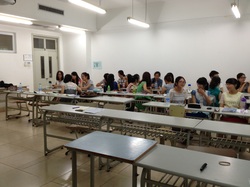This term, my university only has 2 native English teachers, so I've been asked to teach many extra classes.
In addition to the extra classes, I get requests practically every day to teach the friend of a colleague or student. If I wanted to, I could spend every waking hour teaching and make a lot of extra money, but then I'd be so crazy, I'm sure that I wouldn't be an effective teacher in any of the classes!
It's hard to say no, but the sheer number of requests that keep rolling in this term have forced me to become more comfortable with it. At the beginning of the semester, I would try to soften my "no" by at least offering to ask foreign friends if they would be interested in tutoring or teaching an extra class, but now all my foreign friends are tapped out too. So I just say "No, I'm too busy, sorry, I'll let you know if I hear of any other foreign teachers who are looking for extra work." But of course, I'm not likely to hear of any other foreign teachers looking for work since it seems there are simply not enough of them to go around.
One of the reasons why I'm working so much with my master's students on learner autonomy projects is that I'm tired of Chinese students assuming that they can't improve their English without the guidance of a "foreign expert." Many of the people who ask me to tutor their friend or their child assume that just by putting a non-native speaker in the presence of a native speaker, language will be magically acquired.
I actually had one request earlier this term that said, "I have a friend who is going abroad soon, so he hopes he can improve his oral English in several short days by studying with you."
There are no shortcuts to language acquisition. Native speakers are not language genies who can grant your wish of speedy fluency.
Learning language takes work, time, humility, and discipline. It takes willingness to learn no matter what is going on around you or who is available to speak with you - native speaker, non-native speaker, or no one at all. Like I tell my students, when no one is around to practice English with you, speak English to yourself. It's certainly cheaper than hiring a native speaker!
Of course, practicing a language with a native speaker does introduce new, beneficial elements that can't be experienced when speaking with non-native speakers or speaking to yourself. But if a student is unwilling to learn and improve language without the help of a native speaker, I question how successfully they will learn and improve once they find a native speaker to teach them.
In addition to the extra classes, I get requests practically every day to teach the friend of a colleague or student. If I wanted to, I could spend every waking hour teaching and make a lot of extra money, but then I'd be so crazy, I'm sure that I wouldn't be an effective teacher in any of the classes!
It's hard to say no, but the sheer number of requests that keep rolling in this term have forced me to become more comfortable with it. At the beginning of the semester, I would try to soften my "no" by at least offering to ask foreign friends if they would be interested in tutoring or teaching an extra class, but now all my foreign friends are tapped out too. So I just say "No, I'm too busy, sorry, I'll let you know if I hear of any other foreign teachers who are looking for extra work." But of course, I'm not likely to hear of any other foreign teachers looking for work since it seems there are simply not enough of them to go around.
One of the reasons why I'm working so much with my master's students on learner autonomy projects is that I'm tired of Chinese students assuming that they can't improve their English without the guidance of a "foreign expert." Many of the people who ask me to tutor their friend or their child assume that just by putting a non-native speaker in the presence of a native speaker, language will be magically acquired.
I actually had one request earlier this term that said, "I have a friend who is going abroad soon, so he hopes he can improve his oral English in several short days by studying with you."
There are no shortcuts to language acquisition. Native speakers are not language genies who can grant your wish of speedy fluency.
Learning language takes work, time, humility, and discipline. It takes willingness to learn no matter what is going on around you or who is available to speak with you - native speaker, non-native speaker, or no one at all. Like I tell my students, when no one is around to practice English with you, speak English to yourself. It's certainly cheaper than hiring a native speaker!
Of course, practicing a language with a native speaker does introduce new, beneficial elements that can't be experienced when speaking with non-native speakers or speaking to yourself. But if a student is unwilling to learn and improve language without the help of a native speaker, I question how successfully they will learn and improve once they find a native speaker to teach them.

 RSS Feed
RSS Feed
